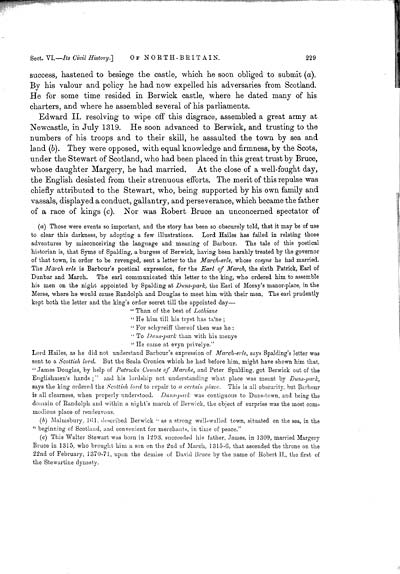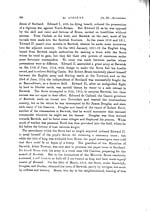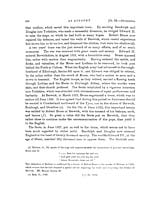Volume 3
(241) Page 229
Download files
Individual page:
Thumbnail gallery: Grid view | List view

229
success, hastened to besiege the castle, which he soon obliged to submit (a).
By his valour and policy he had now expelled his adversaries from Scotland.
He for some time resided in Berwick castle, where he dated many of his
charters, and where he assembled several of his parliaments.
Edward II. resolving to wipe off this disgrace, assembled a great army at
Newcastle, in July 1319. He soon advanced to Berwick, and trusting to the
numbers of his troops and to their skill, he assaulted the town by sea and
land (6). They were opposed, with equal knowledge and firmness, by the Scots,
under the Stewart of Scotland, who had been placed in this great trust by Bruce,
whose daughter Margery, he had married. At the close of a well-fought day,
the English desisted from their strenuous efforts. The merit of this repulse was
chiefly attributed to the Stewart, who, being supported by his own family and
vassals, displayed a conduct, gallantry, and perseverance, which became the father
of a race of kings (c). Nor was Robert Bruce an unconcerned spectator of
(a) Those were events so important, and the story has been so obscurely told, that it may be of use
to clear this darkness, by adopting a few illustrations. Lord Hailes has failed in relating those
adventures by misconceiving the language and meaning of Barbour. The tale of this poetical
historian is, that Syme of Spalding, a burgess of Berwick, having been harshly treated by the governor
of that town, in order to be revenged, sent a letter to the March-erle, whose cosyne he had married.
The March erle is Barbour's poetical expression, for the Earl of March, the sixth Patrick, Earl of
Dunbar and March. The earl communicated this letter to the king, who ordered him to assemble
his men on the night appointed by Spalding at Duns-park, the Earl of Moray's manor-place, in the
Merse, where he would cause Randolph and Douglas to meet him with their men. The earl prudently
kept both the letter and the king's order secret till the appointed day�
" Than of the best of Lothiane
"He him till his tryst has ta'ne ;
" For schyreiff thereof then was he :
" To Dans-park than with his menye
" He came at evyn privelye."
Lord Hailes, as he did not understand Barbour's expression of March-erle, says Spalding's letter was
sent to a Scottish lord. But the Scala Cronica which he had before him, might have shown him that,
" James Douglas, by help of Patricke Counte of Marche, and Peter Spalding, got Berwick out of the
Englishmen's hands ;" and his lordship not understanding what place was meant by Duns-park,
says the king ordered the Scottish lord to repair to a certain place. This is all obscurity, but Barbour
is all clearness, when properly understood. Duns-park, was contiguous to Duns-town, and being the
domain of Randolph and within a night's march of Berwick, the object of surprise was the most com-
modious place of rendezvous.
(b) Malmsbury, 161. described Berwick '" as a strong well-walled town, situated on the sea, in the
{f beginning of Scotland, and convenient for merchants, in time of peace."
(c) This Walter Stewart was born in 1293, succeeded his father, James, in 1309, married Margery
Bruce in 1315, who brought him a son on the 2nd of March, 1315-6, that ascended the throne on the
22nd of February, 1370-71, upon the demise of David Bruce by the name of Robert II., the first of
the Stewartine dynasty.
Set display mode to:
![]() Universal Viewer |
Universal Viewer | ![]() Mirador |
Large image | Transcription
Mirador |
Large image | Transcription
Images and transcriptions on this page, including medium image downloads, may be used under the Creative Commons Attribution 4.0 International Licence unless otherwise stated. ![]()
| Caledonia, or, An account, historical and topographic of North Britain from the most ancient to the present times > Volume 3 > (241) Page 229 |
|---|
| Permanent URL | https://digital.nls.uk/74528556 |
|---|---|
| Description | Vol. III. |
|---|---|
| Attribution and copyright: |
|

